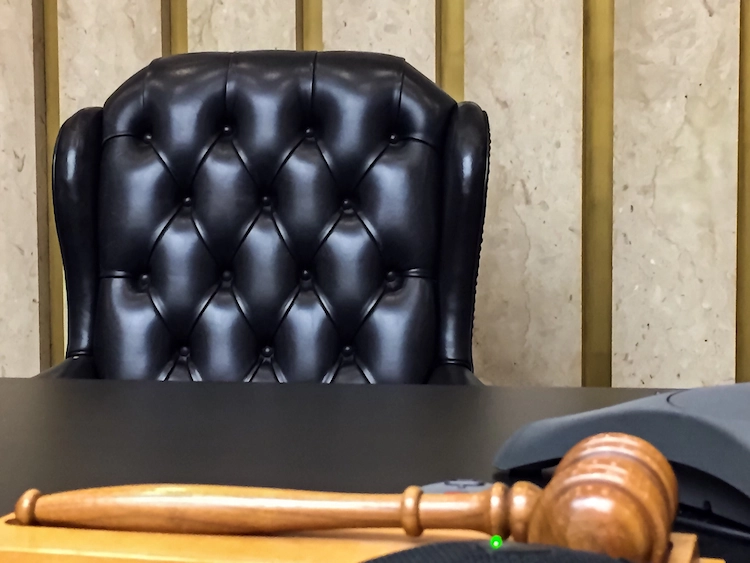
The New Jersey Supreme Court recently heard oral arguments in In re the Matter Concerning the State Grand Jury (089571). The closely watched case centers on whether a grand jury has the authority to investigate the Catholic Church’s handling of sex abuse allegations.
Facts of the Case
In 2018, then-Attorney General Gurbir S. Grewal announced the Clergy Abuse Task Force. The Task Force was created following the publication of a Pennsylvania grand jury report regarding sexual abuse committed by clergy, which included the disclosure of sexual abuse by clergy who had served in New Jersey.
The Attorney General charged the Task Force with investigating allegations of sexual abuse by clergy and efforts to conceal such abuse. The Task Force was empowered to subpoena documents and testimony, present information to a grand jury, and pursue indictments and a grand jury presentment as part of its mandate to address any wrongdoing uncovered.
The Diocese of Camden challenged the grand jury’s authority to issue any presentment on clergy sexual abuse. On May 25, 2023, the trial court issued its oral opinion, holding both that (1) it could lawfully consider the validity of a hypothetical presentment on sexual abuse by clergy and the response thereto, and (2) that the grand jury would lack authority to issue such a presentment. According to the court, the grand jury lacks “authority to return a presentment which focuses … on misconduct by Catholic priests” under Rule 3:6-9(a), which states that presentments “may refer to public affairs or conditions.”
The trial court further found that “private conduct” does not qualify, even where that conduct “is a matter of public concern.” It further held that “[t]he presentment promised here” would not “refer to public affairs [or] conditions” because “priests are not public officials and the Catholic Church is not a public entity.”
The Appellate Division affirmed “substantially for the reasons set forth by the trial court.”
Issues Before the NJ Supreme Court
The New Jersey Supreme Court granted certification on October 18, 2024. The justices agreed to consider the following question:
Does a State Grand Jury have the authority to return a presentment about sexual abuse by members of the clergy?
Oral arguments were held on April 28, 2025. The debate largely focused how a grand jury can be used and if it has the authority to investigate private entities like the diocese or only government officials or agencies. Michael L. Zuckerman, the state’s deputy solicitor general, argued that the lower courts short-circuited the legal process before it could even begin.
“My frontline argument to you is that it is highly premature, inconsistent with the rule, for the trial court to have short-circuited this process before it could even start,” Zuckerman said. “And so for that reason, this court should simply reverse and remand for the process to go forward, possibly clarifying along the way that presentments can sometimes talk about non-governmental actors too.”
Attorney Lloyd D. Levenson, representing the Camden diocese, argued that clergy abuse was “long-ago conduct by private individuals that impacted only a fragment of the population.”
“If this court expands the scope of a grand jury presentment to include private individuals and private entities, conducting investigations in secret under the sole influence of a prosecutor with no opportunity to present a defense, the grand jury’s authority will be unlimited,” he added. “Presentments were never intended to call attention to private conduct within private entities. We ask, respectfully, that this court affirm.”
Several justices questioned if it was premature to act before a grand jury has issued a presentment. “It’s really difficult to speculate as to what a presentment — if 12 grand jurors even vote on a presentment — will look like, and trying to determine how to assess something that has not yet come into existence,” Justice Fabiana Pierre-Louis stated.
The New Jersey Supreme Court is expected to issue a decision within the coming months. Please check back for updates.

The Supreme Court of New Jersey recently granted certification in Extech Building Materials, Inc. v. E&N Construction Inc. The case involves when individuals executing business contracts can be held personally liable.
Facts of Extech Building Materials, Inc. v. E&N Construction Inc.
Plaintiff Extech Building Materials, Inc. (Extech) sought sums allegedly due from defendants Joaquim G. Ferreira and Shawn Roney under their purported personal guarantees of payment for approximately $1,016,627.65 in building materials Extech had delivered to defendant E&N Construction, Inc. (E&N).
Extech’s form credit application expresses contractual obligations for what it refers to as the “Buyer” in the first five numbered paragraphs of the document and also sets forth separate contractual obligations of putative personal guarantors in the sixth numbered paragraph. However, the form signature lines do not require that a person executing the application indicate whether they are signing as representatives of the “Buyer” or as the personal guarantors.
In the document completed in March 2012, Roney’s name is printed and his signature is entered on the first line, and Ferreira’s name is printed and his signature is entered on the second line. Both lines include what appear to be the signature of the same witness. The third line on the form is not completed; it does not include a printed name or any signatures.
Following execution of the credit application, Extech delivered building materials to E&N and, as alleged by Extech, E&N failed to pay $1,016,627.65 and additional service charges for those materials. Extech filed a complaint seeking a judgment for the amounts allegedly due from E&N. In the complaint, Extech also sought judgment against Ferreira and Roney, alleging they had unconditionally guaranteed E&N’s obligations “concurrently with the application for revolving credit.”
Appellate Division’s Decision Extech Building Materials, Inc. v. E&N Construction Inc.
The Law Division granted summary judgment to the defendants. In a per curiam opinion, the Appellate Division reversed. It held that there was ambiguity in the signature lines of the contract. Moreover, determining whether the defendants signed the contract as personal guarantors or strictly on behalf of the company was a factual issue to be determined by a jury.
The signature lines follow a set of contractual obligations for both the Buyer and putative guarantors, so there was no definitive basis on which the court could correctly conclude Ferreira and Roney executed the application as either their acceptance of the terms on behalf of E&N or as personal guarantors,” the appeals court wrote. “The ambiguity in the signature lines of the application and determining whether Ferreira or Roney executed the application as personal guarantors or strictly on behalf of E&N, requires the resolution of factual issues that are dependent on further discovery and, if necessary, disposition by a jury.”
Issues Before the NJ Supreme Court
The New Jersey Supreme Court granted certification. The justices agreed to consider the following question: “If an individual signs a contract on behalf of a corporate entity, and the contract has a provision stating that the individual guarantees payment, is the guarantee enforceable against that individual?”
Oral arguments have not yet been scheduled. Please check back for updates.

In State v. Butler, the New Jersey Supreme Court will address whether a prosecutor’s reference to the television show The Wire tainted the defendant’s trial to the extent that a new trial is warranted. The Appellate Division previously held that the error was not egregious enough.
Facts of State v. Butler
Defendant Gerald W. Butler is appealing his convictions for conspiracy and various drug-related offenses, including possession of a controlled dangerous substance with intent to distribute, distribution of CDS, and his aggregate fifteen-year sentence. He claims the trial was tainted by the prosecutor’s opening and closing statements comparing his conduct to that depicted in the television show The Wire.
Butler further contends that these statements were exacerbated by the repeated testimony suggesting he was a part of a violent network of organized crime, although the evidence was insufficient to demonstrate a conspiracy, and that the court erred by violating a witness’s privilege against self-incrimination, permitting a police officer to testify he had observed what he believed to be a narcotics transaction, allowing an unreliable in-court identification, failing to properly instruct the jury on identification, and imposing an excessive and otherwise incorrect sentence.
Appellate Division’s Decision
The Appellate Division reversed the Defendant’s conviction for conspiracy to distribute CDS, affirmed his remaining convictions, vacated his sentence, and remanded for resentencing. With regard to the prosecutor’s reference to The Wire, the appeals court found that it was not egregious enough to require a new trial. It further found that the unobjected-to trial testimony did not clearly produce an unjust result.
According to the Appellate Division, the prosecutor’s purpose in referencing The Wire was not to inflame the jurors or divert them from the evidence but to reasonably introduce them to the concept of a wiretap, which was at the core of the State’s case. It wrote:
Defendant argues the prosecutor’s reference to The Wire “inflame[d] the jury and distract[ed] them from focusing on the evidence at trial” because the show was “one of the most violent television series ever produced, and one that depicted brutal murders, gang violence, and sexual assault.” Although that may be true, the prosecutor did not reference any “brutal murders, gang violence, or sexual assault” in her opening. Instead, she used the reference to explain how the State had compiled the evidence it would present against defendant.
Issues Before the NJ Supreme Court
The New Jersey Supreme Court granted certification on April 1, 2025 . The justices have agreed to consider the following question:
Did the prosecutor’s reference to the television show The Wire in the opening statement; references to the Organized Crime Unit, gun violence, and trafficking in the City of Millville; and testimony that defendant was the target of a search warrant, individually or cumulatively amount to reversible error?
Oral arguments have not yet been scheduled.

In In Re Appeal of the New Jersey Department of Environmental Protection’s September 6, 2022 Denial of Request for Adjudicatory Hearing (A-42-23/089182) (Decided April 7, 2025), the New Jersey Supreme Court held that the Department of Environmental Protection’s (DEP) grant of a waiver suspending certain environmental remediation obligations did not create a constitutionally protected property interest in that waiver.
Facts of the Case
The Industrial Site Recovery Act (ISRA) prohibits the owner of an industrial establishment from transferring ownership until certain conditions are met, unless the owner pursues one of the alternatives that ISRA provides. One of the listed exceptions, N.J.S.A. 13:1K-11.5, provides for an “[a]pplication for closing [or] transfer when remediation is already in progress.” Under that provision, an entity may apply to the DEP for a Remediation in Progress Waiver (RIP Waiver), which allows that entity to proceed with a triggering event (i.e., sale or cessation of operations) without the typical attendant ISRA requirements “if the industrial establishment is already in the process of a remediation.”
To receive a RIP Waiver, an entity must submit evidence “that the property . . . is being remediated by a prior owner or operator” and that a compliant “remediation funding source” (RFS) has been created. In 2006, the corporate predecessor of Clarios, LLC, purchased an industrial site (“the Site”), for which the seller had executed a remediation plan under ISRA and placed funds in trust for future remediation (“the RFS Trust”). In 2007, Clarios ceased operations, triggering its ISRA responsibilities. Clarios, therefore, sought a RIP Waiver. In March 2007, the DEP granted Clarios’s RIP Waiver but expressly reserved the right to enforce Clarios’s ISRA obligations in the future, informing Clarios that the DEP “continues to reserve all rights to pursue appropriate enforcement actions allowable under the law for violations of ISRA.”
In August 2011, Clarios sold the Site. In 2016, the purchaser of the Site filed for bankruptcy. In July 2021, the purchaser certified that the estimated cost to complete remediation was $563,000 but that the RFS Trust was fully depleted. The purchaser thereafter also missed its February 2022 deadline for completing remediation of the Site. In April 2022, the DEP rescinded Clarios’s RIP Waiver because remediation of the Site was no longer in progress, the RFS Trust was depleted, and the Site was out of compliance. Clarios requested an adjudicatory hearing before the DEP, arguing that the DEP’s rescission of the RIP Waiver without notice or an opportunity to be heard violated its due process rights. The DEP denied the request, stating that rescission of a RIP Waiver does not entitle Clarios to request an adjudicatory hearing pursuant to N.J.A.C. 7:26C-9.10(a) and that rescission does not constitute a contested case requiring a hearing under the Administrative Procedure Act. Clarios appealed that decision.
The Appellate Division ruled in favor of the DEP, holding that Clarios did not have a protected property interest in the RIP Waiver.
NJ Supreme Court’s Decision
The New Jersey Supreme Court affirmed. It held that the DEP’s initial grant of the waiver did not create a property interest in the continued suspension of Clarios’s remediation obligations. According to the Court, neither the controlling statutes and regulations nor a mutually explicit understanding between the parties provided an entitlement to the indefinite continuance of the waiver; to the contrary, the governing laws and agency materials all anticipate the DEP’s ability to enforce remediation obligations in the future.
In reaching its decision, the New Jersey Supreme Court emphasized that a protected property interest requires a “legitimate claim of entitlement,” which may arise from “statutes, regulations, nor a mutually explicit understanding.” It went on to explain that an express statutory or regulatory grant is the clearest and strongest proof of an entitlement.
According to the Court, one indication that a statute or regulation creates a protected property interest is through limitations placed on agency decision-making with respect to an alleged benefit. In contrast, “[i]f the decisionmaker is not ‘required to base its decisions on objective and defined criteria,’ but instead ‘can deny the requested relief for any constitutionally permissible reason or for no reason at all,’ the State has not created a constitutionally protected” interest.
The New Jersey Supreme Court next explained that when an entitlement is not granted and secured through explicit language or limitations on discretion, it may be derived from mutually explicit understandings. However, for an “understanding” to give rise to a property interest, the party asserting an entitlement must establish that both parties mutually recognized the existence of an entitlement. When an agency has broad discretion to grant, deny, or remove a purported benefit, there is also not likely to be a mutually explicit understanding of an entitlement.
Applying these principles to the case, the New Jersey Supreme Court concluded that there was no such indication of an express statutory grant of entitlement in the indefinite continuation of the RIP Waiver at the time of rescission. In support, the Court noted that ISRA provides no guidance on how the DEP should exercise its discretion in enforcing remediation obligations once a property falls out of compliance. Additionally, ISRA does not guarantee Clarios continued viability of the RIP Waiver, regardless of the Site’s compliance status. “Nor do we find any indication of such an entitlement in ISRA’s implementing regulations,” Justice Hoffman wrote. “To the contrary, ISRA’s implementing regulations expressly state that the DEP retains discretionary authority to rescind a RIP Waiver.”
The New Jersey Supreme Court further found that Clarios failed to demonstrate that an extra-statutory or extra-regulatory understanding existed that would support its claim of entitlement. In support, the Court noted that that an “understanding” capable of establishing a property interest cannot exist when, as here, “the government has ample discretion” to deny or withdraw the benefit in question. “[W]hen site remediation is no longer in progress, the DEP’s discretion regarding RIP Waiver rescission is unfettered, countering any argument that a lack of discretion created a mutually explicit understanding that Clarios was entitled to the continuation of the RIP Waiver when the Site was no longer compliant with ISRA,” Justice Hoffman wrote.

In Laurence J. Rappaport v. Kenneth Pasternak (A-32-23/088645) (Decided April 1, 2025), the Supreme Court of New Jersey held that the Appellate Division erred in modifying a private arbitration award. In so ruling, the Court emphasized the deferential standard governing judicial review of arbitration awards set forth in both New Jersey Arbitration Act (NJAA) and New Jersey case law.
Facts of Rappaport v. Pasternak
The appeal arises from a dispute among members of several limited liability companies that was arbitrated pursuant to the parties’ agreement. In a series of awards, the arbitrator ruled on numerous claims and counterclaims. He awarded $4.9 million to plaintiff Laurence Rappaport on various claims, offset by an award on a claim asserted by defendant Kenneth Pasternak, for a net award of approximately $3.8 million. The arbitrator did not award Rappaport damages for the loss of future distributions of carried interest.
Following the arbitrator’s awards, Rappaport contended that the question of carried interest had not been presented to the arbitrator, and that the arbitrator had improperly ruled that he was not entitled to such distributions. After remanding for clarification that the arbitrator intended his awards to resolve the issue of carried interest, the Chancery Division confirmed the awards. Rappaport appealed, and the Appellate Division affirmed the arbitrator’s awards for Rappaport’s claims for lost income and future income based on his termination as a manager. However, the Appellate Division ruled that the parties had “specifically excluded” the question of carried interest from the arbitration, and that “Rappaport’s interest as an investor was not a claim raised in arbitration.”
Based on its reading of the record, the appellate court concluded that the arbitrator had sua sponte raised the question of carried interest in the arbitration. It rejected as “implausible” the arbitrator’s valuation of Rappaport’s aggregate claim at $4.9 million and ruled that Rappaport was entitled to carried interest going forward under the operating agreements. It modified the awards “to exclude any inclusion of Rappaport’s membership interest, including any future carried interest accruing after the conclusion of arbitration testimony” and reversed the judgment of the Chancery Division.
NJ Supreme Court’s Decision in Rappaport v. Pasternak
The New Jersey Supreme Court reversed. It disagreed with the Appellate Division’s conclusion that it was the arbitrator, not the parties, who introduced the question of carried interest in the arbitration. The Court further held that the remedy of modification under N.J.S.A. 2A:23B-24(a)(2) is not warranted in this case, and the Appellate Division’s review of the award did not conform to the deferential standard governing judicial review of arbitration awards.
As the New Jersey Supreme Court explained, the New Jersey Arbitration Act (NJAA) outlines three circumstances in which a court may modify an arbitration award, one of which applies when “the arbitrator made an award on a claim not submitted to the arbitrator and the award may be corrected without affecting the merits of the decision upon the claims submitted.” Similarly, New Jersey case law authorizes an order vacating a private sector arbitration award “only for fraud, corruption, or similar wrongdoing on the part of the arbitrators,” and permits modification of an award only when the court finds the arbitrator has made one of the “very specifically defined mistakes” identified in the NJAA.
After recognizing the limited scope of appellate review, the New Jersey Supreme Court first addressed the Appellate Division’s conclusion that when the arbitrator declined Rappaport’s request for carried interest, he ruled on a claim not presented to him. In reaching the opposite conclusion, the Court found that there was no dispute that the issue of carried interest was arbitrable. It further cited that there was no evidence in the record that the parties excluded the question of carried interest from the arbitration. Rather, Rappaport’s right to carried interest — an arbitrable issue under the parties’ arbitration agreement – was vigorously disputed by the parties at several stages of the arbitration.
The New Jersey Supreme Court next turned to the Appellate Division’s modification of the arbitration award. According to the Court, the Appellate Division’s decision failed to meet the standard for modification set forth in N.J.S.A. 2A:23B-24(a)(2), which requires that the award includes “a claim not submitted to the arbitrator and the award may be corrected without affecting the merits of the decision upon the claims submitted.”
In support, the New Jersey Supreme Court found that the appeal court’s remedy fundamentally affected the merits of the arbitrator’s decision on other claims indisputably presented to him. It also cited that the award of $4.9 million reflected the arbitrator’s assessment of the carried interest claim, as well as claims for other categories of damages.
Going forward, the New Jersey Supreme Court suggested that when parties intend to exclude from an arbitration one or more issues that fall within the scope of the arbitration agreement, they should identify those issues in writing for the arbitrator and all counsel prior to the arbitration proceeding.

In Musker v. Suuchi, Inc. (A-8-24/089665) (Decided March 17, 2025), the New Jersey Supreme Court held that “commissions” are considered “wages” under the Wage Payment Law (WPL). Accordingly, commissions are subject to the WPL’s protections.
Facts of Musker v. Suuchi, Inc.
Plaintiff Rosalyn Musker worked in sales for defendant Suuchi, Inc. (Suuchi), which sells software subscriptions to apparel manufacturers. In addition to her base salary, Musker was eligible for commissions under Suuchi’s Sales Commission Plan (SCP). In March 2020, in response to the COVID-19 pandemic, Suuchi decided to sell Personal Protective Equipment (PPE), also on a commission basis.
Musker generated approximately $34,448,900 in gross revenue by selling PPE. The parties disputed whether the 4% commission she was entitled to for those sales was of gross or net revenue. The parties also disagreed about whether Musker’s PPE commissions are “wages” or are excluded from the WPL as “supplementary incentives” under N.J.S.A. 34:11-4.1(c).
To constitute a “wage” under the WPL, there first must be “direct monetary compensation for labor or services rendered by an employee.” N.J.S.A. 34:11-4.1(c). Second, an employee’s “direct monetary compensation” can be “determined on a time, task, piece, or commission basis.” Also relevant, the statute includes an exception from the definition of “wages” for “supplementary incentives . . . which are calculated independently of regular wages
and paid in addition thereto.”
Musker filed a complaint alleging that Suuchi violated the WPL by withholding her “wages.” The trial judge dismissed the WPL claims, holding that Musker’s PPE commissions were not “wages” under the WPL. The Appellate Division affirmed. The appeals court emphasized that “[i]n many, perhaps most, instances a promised commission will qualify as ‘wages’ under the [WPL] and not comprise a supplementary incentive.” However, the Appellate Division “concur[red] with the trial [judge’s] determination that the commissions claimed by [Musker] on PPE sales were not ‘wages’ under the [WPL] but instead were ‘supplementary incentives’” and therefore excluded from the WPL.
NJ Supreme Court’s Decision in Musker v. Suuchi, Inc.
The New Jersey Supreme Court unanimously reversed, holding that “commissions” are “wages” under the WPL. As Justice Douglas M. Fasciale explained:
The WPL defines “wages” as “direct monetary compensation for labor or services rendered by an employee, where the amount is determined on a time, task, piece, or commission basis.” Under that definition, compensating an employee by paying a “commission” for “labor or services” always constitutes a wage under the WPL. Therefore, contrary to the appellate court’s conclusion, a “commission” under the WPL cannot be excluded from the definition of “wages” as a “supplementary
incentive.”
In reaching its decision, the New Jersey Supreme Court cited the ordinary meaning of the key terms in dispute. It noted that a “supplementary incentive” is compensation that motivates employees to do something above and beyond their “labor or services.” Thus, “commission” earned “for labor or services rendered by an employee” can never be a “supplementary incentive.” The Court further found it would be “illogical” and contrary to the canons of statutory interpretation to interpret the WPL’s reference to “supplementary incentives” to include “commissions.”
Applying this analysis to the facts of the case, the New Jersey Supreme Court found that selling PPE required Musker to render “labor or services” as an employee of Suuchi; it further found it “undisputed” that Musker’s compensation for PPE sales was determined on a commission basis. Those PPE commissions, which she earned solely because she performed “labor or services,” are therefore “wages” under N.J.S.A. 34:11-4.1(c).
According to the New Jersey Supreme Court, just because a product is new and potentially sold only temporarily does not mean that sales of that product somehow fall outside the regular “labor or services” an employee provides. The Court also emphasized that receiving a base salary does not turn “commissions” into “supplementary incentives” under the WPL.

In Estate of Crystal Walcott Spill v. Jacob E. Markovitz, M.D. (A-34-23/088764) (Decided March 11, 2025), the Supreme Court of New Jersey held that an individual outside the reach of New Jersey’s jurisdiction is not a party within the definition of the Comparative Negligence Act (CNA) for purposes of allocation. However, that individual may be a joint tortfeasor for purposes of seeking contribution under the Joint Tortfeasors Contribution Law (JTCL).
Facts of Estate of Crystal Walcott Spill v. Jacob E. Markovitz, M.D.
After the death of Crystal Walcott Spill, her estate and beneficiaries (plaintiffs) brought a wrongful death suit against doctors who treated her. Spill was under the care of Jenny T. Diep, M.D., a rheumatologist based in New York. Spill also received unrelated care from Jacob E. Markovitz, M.D., a gynecologist based in New Jersey.
Spill scheduled a surgical procedure with Dr. Markovitz for February 16, 2018. Before the procedure, Spill had a routine appointment with Dr. Diep, and laboratory tests from that appointment revealed elevated creatinine levels and high blood pressure. In response, Dr. Diep doubled Spill’s daily dosage of a blood pressure medication and recommended that Spill see a nephrologist.
One day before her scheduled surgical procedure, Spill had an initial visit with Holly M. Koncicki, M.D., a nephrologist based in New York. Dr. Koncicki performed additional laboratory tests but did not receive the results or have an opportunity to discuss those results with Dr. Diep before Spill’s surgery. During the procedure, Spill suffered a significant cardiac event. She died later that day. On February 17, 2018, Dr. Koncicki’s records indicated that Spill’s laboratory test results — which revealed critically elevated creatinine and potassium levels — had been available on the evening of her death.
Plaintiffs filed suit and named as defendants, among others, Dr. Steven Paganessi, the attending anesthesiologist for Spill’s surgery, and his medical group (collectively, the “defendants”). Plaintiffs alleged that the doctors negligently proceeded with the surgery without waiting for the laboratory results from Dr. Koncicki. Plaintiffs did not name Dr. Diep as a co-defendant and have never attempted to assert claims against her in this action or any other suit. Defendants moved for an allocation of fault against Dr. Diep and filed a third-party complaint against Dr. Diep and her practice.
Dr. Diep moved to dismiss defendants’ third-party complaint for lack of personal jurisdiction. The trial court granted Dr. Diep’s motion and denied defendants’ motion to include Dr. Diep on the verdict form, citing a lack of precedential authority to support defendants’ theory that Dr. Diep — a non-party alleged joint tortfeasor over whom the court did not have personal jurisdiction — should be included on a verdict form for apportionment of fault.
The Appellate Division agreed. It held that an out-of-state individual over whom a New Jersey court does not have personal jurisdiction, such as Dr. Diep, is neither a party nor a tortfeasor, and there should not be an allocation as to such an individual.
NJ Supreme Court’s Decision in Estate of Crystal Walcott Spill v. Jacob E. Markovitz, M.D.
The New Jersey Supreme Court partly agreed with the Appellate Division. The Court agreed that an individual outside the reach of New Jersey’s jurisdiction is not a party within the definition of the CNA for purposes of allocation. However, it further found that an individual may be a joint tortfeasor for purposes of seeking contribution under the JTCL.
In reaching its decision, the New Jersey Supreme Court explained that while the CNA and the JTCL both provide for allocations of fault against, or contributions from, individuals and entities, the language of the statutes differs in important respects. Notably, the CNA allows allocation of fault during a trial only to a “party” or “parties,” whereas the JTCL allows “joint tortfeasors” to seek contribution after a trial from other “persons” alleged to be “liable in tort for the same injury.”
Relying on the text of the statute and prior cases where the Court and the Appellate Division considered whether allocation of fault is permissible when an alleged tortfeasor is absent, dismissed, or barred from the litigation in a variety of circumstances, the New Jersey Supreme Court determined that permitting an allocation of fault against Dr. Diep would be inconsistent with the CNA under the circumstances of this case.
In support, it the Court cited that Dr. Diep, as a non-party alleged tortfeasor who is outside the jurisdictional arm of New Jersey courts, is not a “party” subject to allocation by the jury pursuant to the CNA. “Dr. Diep has never been and may never be a party to this case within the definition of the CNA. She is not subject to personal jurisdiction in this state; she has no contacts to this state; and none of the underlying conduct in which she was involved is alleged to have occurred within this state,” the Court wrote. “There are no circumstances in which a court in New Jersey could exercise jurisdiction over her on this record.”
The New Jersey Supreme Court also highlighted that Dr. Diep’s exclusion from the lawsuit in New Jersey — i.e., the reason she is a non-party — is not the result of any act, or failure to act by plaintiffs. “Although plaintiffs could have maintained an action against Dr. Diep in New York, they chose not to pursue that course. In other cases, the plaintiffs’ litigation strategies caused the defendants’ inability to pursue contribution from potential joint tortfeasors,” the Court explained. “But here, defendants are unable to make any such allegation. This matter is similarly devoid of any evidence of prejudice to the defendants.”
The New Jersey Supreme Court went on to find that the same is not true under the JTCL, emphasizing that prohibiting apportionment of fault to Dr. Diep as a non-party is not inconsistent with defendants’ allegation that she may be a joint tortfeasor. Accordingly, if a judgment is rendered in this matter against defendants, they may pursue any available contribution claims in a jurisdiction relevant to any additional alleged tortfeasors.

On February 14, 2025, the New Jersey Supreme Court agreed to consider Ormond Simpkins, Jr. v. South Orange-Maplewood School District (089974). The closely watched case will address whether a public school district can be held vicariously liable for sexual abuse committed by a teacher outside the scope of her employment. The Appellate Division previously held that the school district could not be held liable under the New Jersey Tort Claims Act’s vicarious liability provision.
Facts of the Case
Ormond Simpkins, Jr., Frankie Jerome and Brandon Hayes each filed suit against the South Orange-MaplewoodSchool District (District) alleging they were sexually abused by Nicole Dufault, a language arts and special education teacher at Columbia High School while they were students during the 2013-14 school year. Plaintiffs, who were between the ages of fourteen and seventeen, allege the abuse took place on multiple occasions in Dufault’s classroom during school hours as well as in her car on school grounds and elsewhere.
Plaintiffs claim Dufault altered their attendance records to excuse their absences from other classes when they were with her and favorably manipulated their grades. The abuse continued until September 2014, when a video surfaced of Dufault engaged in sexual relations with another student, and she was arrested.
The trial court granted the District’s motion to dismiss with prejudice those counts of all three complaints pleading common law claims seeking to hold the District vicariously liable for Dufault’s alleged abuse.1 The court held the Tort Claims Act’s vicarious liability provision, N.J.S.A. 59:2-2(a), permits a public entity to be held liable only for those acts of its employees occurring within the scope of their employment. The court found “DuFault’s alleged assault and sexual abuse of plaintiff[s] was clearly outside the scope of her employment,” being obviously beyond anything authorized by the District and not in any way actuated by a purpose to serve her employer.
Appellate Division’s Decision
The Appellate Division affirmed. In doing so, it rejected the Plaintiffs’ reliance on the aided-by-agency theory from Hardwicke v. American Boychoir School, 188 N.J. 69 (2006), and the 2019 amendments to the New Jersey Tort Claims Act. As the appeals court explained:
There is no question but that the Court in Hardwicke held a private entity qualifying as a passive abuser under the Child Sexual Abuse Act may be held vicariously liable for common law claims alleging conduct within the Act’s definition of sexual abuse committed by an employee acting outside the scope of his employment in accord with section 219(2)(d) of the Restatement. But that a private entity may be held liable for the torts of an employee outside the scope of employment will not make a public entity similarly liable because “[t]he liability of the public entity must be found in the [Tort Claims] Act.”
Issues Before the NJ Supreme Court
The New Jersey Supreme Court granted certification. The justices have agreed to consider the following question:
Under the circumstances presented, where plaintiffs allege that they were sexually abused by a former teacher on school grounds during school hours, can a public entity be held vicariously liable for those acts?
Oral arguments have not yet been scheduled. Please check back for updates.

On March 3, 2025, the Supreme Court of New Jersey heard oral arguments in Kratovil v. City of New Brunswick. The closely watched case involves a journalist’s legal challenge the constitutionality of Daniel’s Law, which prohibits the disclosure of the home addresses of certain public officials, including judges, prosecutors, and law enforcement personnel.
Facts of Kratovil v. City of New Brunswick
Plaintiff Charles Kratovil (Kratovil or Plaintiff), who writes for and edits an online publication, brought an as-applied constitutional challenge to Daniel’s Law after Defendants the City of New Brunswick (the City) and Anthony Caputo, the former Director of the City’s Police Department, notified the Plaintiff that he should not re-publish Caputo’s home address. As set forth in court documents, Kratovil, who writes for and edits New Brunswick Today, discovered that Caputo, who was also a Commissioner of the City’s Parking Authority, was not attending municipal meetings in person.
After Kratovil came to believe that Caputo was living in Cape May, he filed an OPRA request with the Cape May County Board of Elections (the Cape May Board), requesting Caputo’s voter profile. That voter profile included Caputo’s home address. On May 3, 2023, Katovil attended another City Council meeting where he discussed Caputo’s change of residence, that Caputo’s residence in Cape May was approximately a two-hour drive from the City, and that Caputo was serving on the City’s Parking Authority even though he was a non-resident. During that discussion, Kratovil stated the street name in Cape May where Caputo was registered to vote. He also provided City Council members with copies of Caputo’s voter profile, which included Caputo’s complete home address.
On May 15, 2023, Kratovil received a letter notifying him that Caputo was invoking Daniel’s Law to prevent re-publication of his home address. On July 12, 2023, he filed a verified complaint and order to show cause seeking temporary and permanent restraints. Kratovil stated that he planned to publish an article about Caputo living in Cape May, which would include Caputo’s home address. So, he sought a declaration that Daniel’s Law was unconstitutional as applied to his intended publication. He also sought preliminary and permanent injunctions prohibiting defendants from seeking to impose civil or criminal sanctions on him if he published Caputo’s home address.
The trial court denied the injunction and dismissed the compliant. On appeal, Kratovil argued that Daniel’s Law is unconstitutional as applied to his intention to publish Caputo’s home address because he obtained that address lawfully and it is a matter of public concern.
Appellate Division Decision in Kratovil v. City of New Brunswick
The Appellate Division affirmed, holding that Daniel’s Law as applied to the Plaintiff does not violate his First Amendment rights of free speech and free press. In reaching its decision, the appeals court acknowledged that it was a matter of public concern that Caputo lived in Cape May while serving as the City’s Director of Police and a Commissioner of the City’s Parking Authority. Additionally, Kratovil always had the right to publish that Caputo lived in Cape May, which was a substantial distance from the City, without being subject to Daniel’s Law sanctions.
However, the Appellate Division also agreed with the trial court that Kratovil was not entitled to injunctive relief. “The trial court’s conclusion that Caputo’s exact street address is not a matter of public concern is supported by the record and consistent with the law,” the court wrote. “In that regard, we also agree with the trial court that protecting public officials from violent attacks and harassment is a compelling State interest of the highest order.”
Oral Arguments in Kratovil v. City of New Brunswick
The New Jersey Supreme Court granted certification last year. In doing so, the justices agreed consider whether Daniel’s Law is unconstitutional as applied to the Plaintiff.
Chief Justice Stuart Rabner, who advocated for Daniel’s Law to be enacted, did not participate in oral arguments, along with Justices Douglas Fasciale and John Jay Hoffman. Appellate Division Judge Jack Sabatino, who temporarily sat on the Supreme Court until last year, heard the case with the Court’s other justices.
During oral arguments, Kratovil maintained that once a public entity discloses information, it can’t penalize its publication in a news article regarding a matter of public interest. “This case asks a simple question about whether the government can provide information to a reporter, then later attempt to punish the reporter for reporting that same information in a story about an issue of public concern. It cannot,” Kratovil’s attorney said.
In response, the City of New Brunswick argued that the Appellate Division decision should stand. “The street number and the street name are not a matter of public importance and therefore does not add anything to the free and robust debate on the public issues that plaintiff is espousing,” the city’s attorney argued. “His request to bootstrap non-relevant personal information should not be tolerated by this court.”
While the New Jersey Supreme Court appeared inclined to uphold Daniel’s Law, we must await the Court’s final decision. Please check back for updates.

On March 3, 2025, the Supreme Court of New Jersey heard oral arguments in Kratovil v. City of New Brunswick. The closely watched case involves a journalist’s legal challenge the constitutionality of Daniel’s Law, which prohibits the disclosure of the home addresses of certain public officials, including judges, prosecutors, and law enforcement personnel.
Facts of Kratovil v. City of New Brunswick
Plaintiff Charles Kratovil (Kratovil or Plaintiff), who writes for and edits an online publication, brought an as-applied constitutional challenge to Daniel’s Law after Defendants the City of New Brunswick (the City) and Anthony Caputo, the former Director of the City’s Police Department, notified the Plaintiff that he should not re-publish Caputo’s home address. As set forth in court documents, Kratovil, who writes for and edits New Brunswick Today, discovered that Caputo, who was also a Commissioner of the City’s Parking Authority, was not attending municipal meetings in person.
After Kratovil came to believe that Caputo was living in Cape May, he filed an OPRA request with the Cape May County Board of Elections (the Cape May Board), requesting Caputo’s voter profile. That voter profile included Caputo’s home address. On May 3, 2023, Katovil attended another City Council meeting where he discussed Caputo’s change of residence, that Caputo’s residence in Cape May was approximately a two-hour drive from the City, and that Caputo was serving on the City’s Parking Authority even though he was a non-resident. During that discussion, Kratovil stated the street name in Cape May where Caputo was registered to vote. He also provided City Council members with copies of Caputo’s voter profile, which included Caputo’s complete home address.
On May 15, 2023, Kratovil received a letter notifying him that Caputo was invoking Daniel’s Law to prevent re-publication of his home address. On July 12, 2023, he filed a verified complaint and order to show cause seeking temporary and permanent restraints. Kratovil stated that he planned to publish an article about Caputo living in Cape May, which would include Caputo’s home address. So, he sought a declaration that Daniel’s Law was unconstitutional as applied to his intended publication. He also sought preliminary and permanent injunctions prohibiting defendants from seeking to impose civil or criminal sanctions on him if he published Caputo’s home address.
The trial court denied the injunction and dismissed the compliant. On appeal, Kratovil argued that Daniel’s Law is unconstitutional as applied to his intention to publish Caputo’s home address because he obtained that address lawfully and it is a matter of public concern.
Appellate Division Decision in Kratovil v. City of New Brunswick
The Appellate Division affirmed, holding that Daniel’s Law as applied to the Plaintiff does not violate his First Amendment rights of free speech and free press. In reaching its decision, the appeals court acknowledged that it was a matter of public concern that Caputo lived in Cape May while serving as the City’s Director of Police and a Commissioner of the City’s Parking Authority. Additionally, Kratovil always had the right to publish that Caputo lived in Cape May, which was a substantial distance from the City, without being subject to Daniel’s Law sanctions.
However, the Appellate Division also agreed with the trial court that Kratovil was not entitled to injunctive relief. “The trial court’s conclusion that Caputo’s exact street address is not a matter of public concern is supported by the record and consistent with the law,” the court wrote. “In that regard, we also agree with the trial court that protecting public officials from violent attacks and harassment is a compelling State interest of the highest order.”
Oral Arguments in Kratovil v. City of New Brunswick
The New Jersey Supreme Court granted certification last year. In doing so, the justices agreed consider whether Daniel’s Law is unconstitutional as applied to the Plaintiff.
Chief Justice Stuart Rabner, who advocated for Daniel’s Law to be enacted, did not participate in oral arguments, along with Justices Douglas Fasciale and John Jay Hoffman. Appellate Division Judge Jack Sabatino, who temporarily sat on the Supreme Court until last year, heard the case with the Court’s other justices.
During oral arguments, Kratovil maintained that once a public entity discloses information, it can’t penalize its publication in a news article regarding a matter of public interest. “This case asks a simple question about whether the government can provide information to a reporter, then later attempt to punish the reporter for reporting that same information in a story about an issue of public concern. It cannot,” Kratovil’s attorney said.
In response, the City of New Brunswick argued that the Appellate Division decision should stand. “The street number and the street name are not a matter of public importance and therefore does not add anything to the free and robust debate on the public issues that plaintiff is espousing,” the city’s attorney argued. “His request to bootstrap non-relevant personal information should not be tolerated by this court.” While the New Jersey Supreme Court appeared inclined to uphold Daniel’s Law, we must await the Court’s final decision. Please check back for updates.
